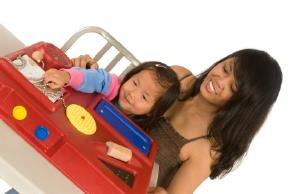
Everyday life with autism may be complex or it may become routine. Parents, siblings and other family members contribute to the life of a person with autism. By understanding the condition and incorporating methods to handling difficult situations, everyday life can be rewarding and positive.
Improving Everyday Life with Autism
Children with autism react differently to stimuli than those without autism do. It is difficult to determine just what life will be like if your child has autism since this depends on the place on the autism spectrum that the child's condition is. Those with debilitating autism may need constant care. Those with high functioning autism, such as Asperger's syndrome, may not require any specialized care.
Managing the Daily Routine
One of the fundamental ways to improve everyday life's struggles with autism is to focus on a daily routine. Many children with autism rely on a routine and may become agitating or overwhelmed when something does not follow the routine.
- Get up and go to bed around the same time each day.
- A morning and bedtime routine is critical. Tasks such as hygiene and getting dressed may be stressful if you do not establish a routine ahead of time.
- Breakfast and other meals should follow the same process daily. At mealtime, the child should wash hands, sit at their place, say prayers, eat, clean up, etc. A routine at mealtime will reduce stress on the family. Some children may want the same food every day for lunch. If it is a healthy option, allow this.
- Schedule playtime, education time and even television time at the same time daily.
- When there are situations where the routine may not occur, explain to the child several times throughout the day. Help them to deal with the worry.
- Parents should schedule time for one on one time with the child. Some autistic children respond better to parents than anyone else.
Coping with Autism Difficulties
One aspect of autism in some children is the difficulty they have dealing with socialization. Depending on the extent of the autism, some children will not play well with others. They may not interact with other children or adults. Touching, communicating, sharing and understanding feelings are all difficult tasks for autistic children.As a parent, sometimes it can be difficult to deal with outbursts or communication issues surrounding these situations. However, it is critical that the same practice be in use as often as possible. If you establish a method for discipline, stick with it every time.
- Communicate the problem with the child on a one on one basis.
- Tell them the proper way to handle the situation. Teach them how to handle these situations.
- If the child continues to misbehave, provide the proper punishment, based on the child's ability to understand.
- Children with autism may need taught the same thing many times before they pick it up, especially when it comes to social situations.
Be consistent in any situation possible. Ensure that you make every problem moment a teaching moment for your child. Doing so will help them to improve their understanding of the world around them.
Other People and Autism
Everyday life with autism within your home is something that will develop over time. Quirks and unique schedules will emerge. If they allow you and your child to get through the day with less stress and frustration, there is no problem with it.

Many parents face difficulties when they have to explain situations to other people. Having a lunch guest at the home may throw off the routine. Explaining to children that your child does not like hugging can be difficult. Be brief and only provide the necessary information.
Although there is no set in stone method that works for all of these situations, rest assured that most parents with autistic children feel the same. It can be difficult to explain to others about autism, but doing so educates them on an ever-increasing condition.







